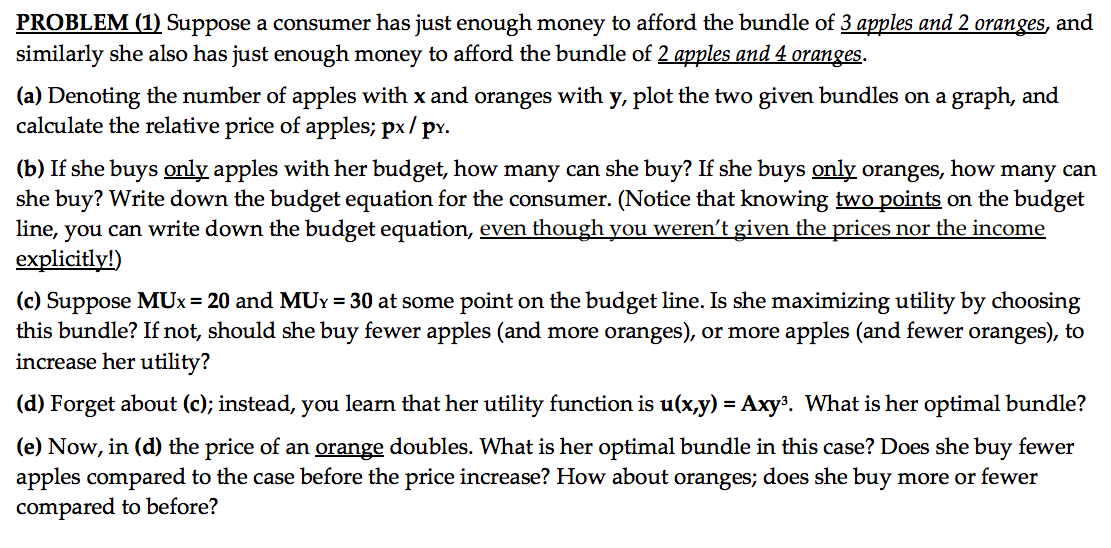PROBLEM (1) Suppose a consumer has just enough money to afford the bundle of 3 apples and 2 oranges, and similarly she also has just enough money to afford the bundle of 2 apples and 4 oranges. (a) Denoting the number of apples with x and oranges with y, plot the two given bundles on a graph, and calculate the relative price of apples; px / py. (b) If she buys only apples with her budget, how many can she buy? If she buys only oranges, how many can she buy? Write down the budget equation for the consumer. (Notice that knowing two points on the budget line, you can write down the budget equation, even though you weren't given the prices nor the income explicitly!) (c) Suppose MUx = 20 and MUY = 30 at some point on the budget line. Is she maximizing utility by choosing this bundle? If not, should she buy fewer apples (and more oranges), or more apples (and fewer oranges), to increase her utility? (d) Forget about (c); instead, you learn that her utility function is u(x,y) = Axy³. What is her optimal bundle? (e) Now, in (d) the price of an orange doubles. What is her optimal bundle in this case? Does she buy fewer apples compared to the case before the price increase? How about oranges; does she buy more or fewer compared to before?
PROBLEM (1) Suppose a consumer has just enough money to afford the bundle of 3 apples and 2 oranges, and similarly she also has just enough money to afford the bundle of 2 apples and 4 oranges. (a) Denoting the number of apples with x and oranges with y, plot the two given bundles on a graph, and calculate the relative price of apples; px / py. (b) If she buys only apples with her budget, how many can she buy? If she buys only oranges, how many can she buy? Write down the budget equation for the consumer. (Notice that knowing two points on the budget line, you can write down the budget equation, even though you weren't given the prices nor the income explicitly!) (c) Suppose MUx = 20 and MUY = 30 at some point on the budget line. Is she maximizing utility by choosing this bundle? If not, should she buy fewer apples (and more oranges), or more apples (and fewer oranges), to increase her utility? (d) Forget about (c); instead, you learn that her utility function is u(x,y) = Axy³. What is her optimal bundle? (e) Now, in (d) the price of an orange doubles. What is her optimal bundle in this case? Does she buy fewer apples compared to the case before the price increase? How about oranges; does she buy more or fewer compared to before?
Chapter4: Utility Maximization And Choice
Section: Chapter Questions
Problem 4.3P
Related questions
Question
Only parts d and e please

Transcribed Image Text:PROBLEM (1) Suppose a consumer has just enough money to afford the bundle of 3 apples and 2 oranges, and
similarly she also has just enough money to afford the bundle of 2 apples and 4 oranges.
(a) Denoting the number of apples with x and oranges with y, plot the two given bundles on a graph, and
calculate the relative price of apples; px/
pr.
(b) If she buys only apples with her budget, how many can she buy? If she buys only oranges, how many can
she buy? Write down the budget equation for the consumer. (Notice that knowing two points on the budget
line, you can write down the budget equation, even though you weren't given the prices nor the income
explicitly!)
(c) Suppose MUx = 20 and MUY = 30 at some point on the budget line. Is she maximizing utility by choosing
this bundle? If not, should she buy fewer apples (and more oranges), or more apples (and fewer oranges), to
increase her utility?
(d) Forget about (c); instead, you learn that her utility function is u(x,y) = Axy³. What is her optimal bundle?
(e) Now, in (d) the price of an orange doubles. What is her optimal bundle in this case? Does she buy fewer
apples compared to the case before the price increase? How about oranges; does she buy more or fewer
compared to before?
Expert Solution
This question has been solved!
Explore an expertly crafted, step-by-step solution for a thorough understanding of key concepts.
Step by step
Solved in 2 steps

Recommended textbooks for you

